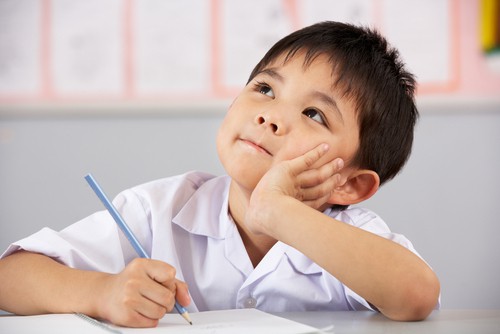While it seems just like yesterday that your child was moving from the infant room to the toddler class, now she’s a preschooler! And as she moves through her preschool years, she’ll be picking up all sorts of new skills that will prepare her for the next step in her academic career: grade school. Is she ready for the big transition? Here are ten signs that she’s prepared!
- She can follow basic directions. Can your child listen to a list of two or three consecutive instructions, and carry them out? Of course, she may not choose to do so all the time, but the ability should be there.
- He can sit still. We’re not talking about some wiggling and bouncing. Kids will fidget, and after an extended period of attention, they will become restless. But your child should be able to stay in one spot during a book, song, or group activity.
- She can the bathroom independently. Not only should grade school age kids be potty trained, but they should be developing some mastery over what happens in the bathroom, including pulling up and down garments, flushing, and washing hands.
- He can recognize a few letters and numbers. Yes, some kids this age can rattle off the alphabet and recite the numbers up to 20, but your child doesn’t need to have complete confidence in those tasks. Simply recognizing some letters and numbers and having an interest in learning more is key.
- She has some mastery of fine and gross motor skills. Is she running and climbing and jumping on the playground? If you hand her a pencil and a pair of scissors, can she use them independently?
- He knows how to get along with schoolmates. Kids are going to argue, cry, and have their differences. But understanding the importance of sharing and taking turns should at least be on your child’s radar at this age.
- She can cope with her emotions. Kids this age have very big emotions, and can become overwhelmed by them from time to time. What child doesn’t break down in tears when she is frustrated? (Heck, adults do this, too!) But understanding her emotions and developing strategies to cope with them is an important skill to cultivate at this age.
- He can dress himself. Can your little one put on his jacket and zip it up? Does he knows how to button his pants and put on his shoes? Beginning to master these skills is important as he moves on to a classroom where independence will become the name of the game.
- She has an interest in books. As she prepares herself to learn to sound out words and pick up a book to actually read the words instead of the pictures, an interest in stories that are read to her and the ability to engage with the pictures is an indicator of future reading success.
- He has an overall interest in learning. If your child can pay attention in class, listening to a story being read, engaging with a classroom conversation, or reporting back to you what he has learned during the day, he is ready to continue his journey!
Not every preschooler has these skills mastered by the time they leave preschool. Children with special needs and kids who are not neurotypical will need support in some of these areas throughout grade school. And some kids just need a boost in order to develop in some of these areas. If you’re concerned, speak with your preschool teacher about your child’s needs.

